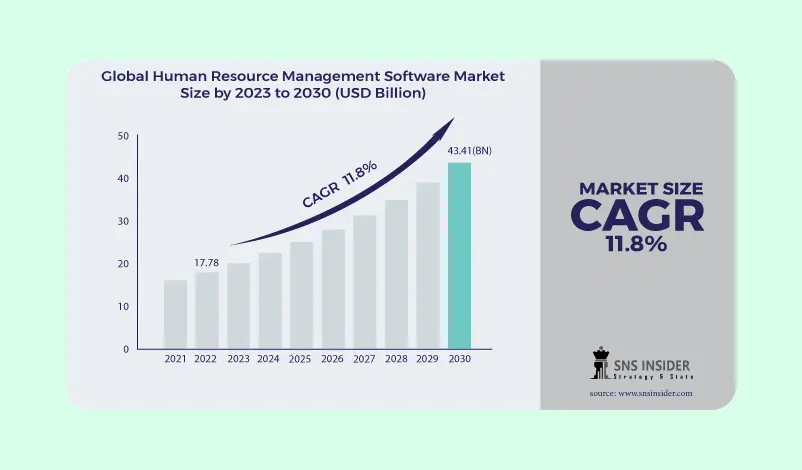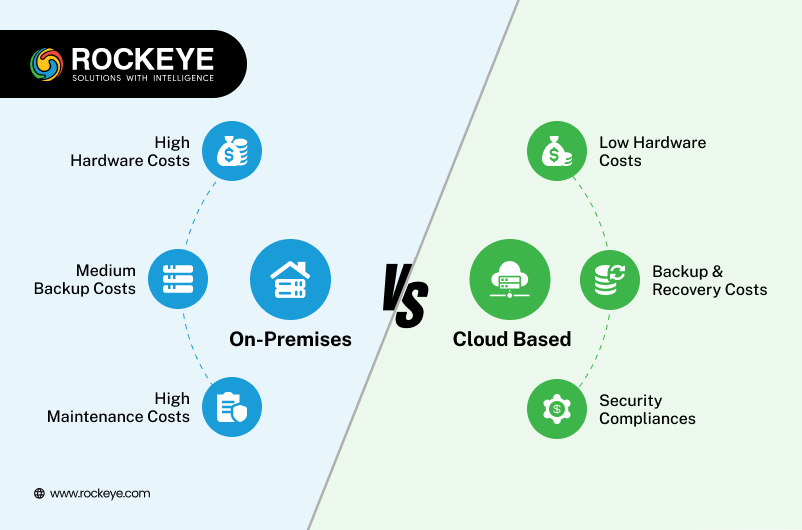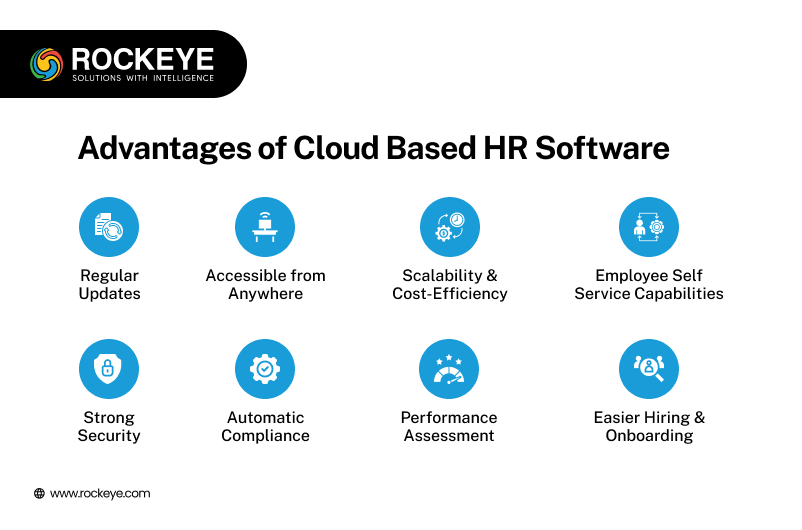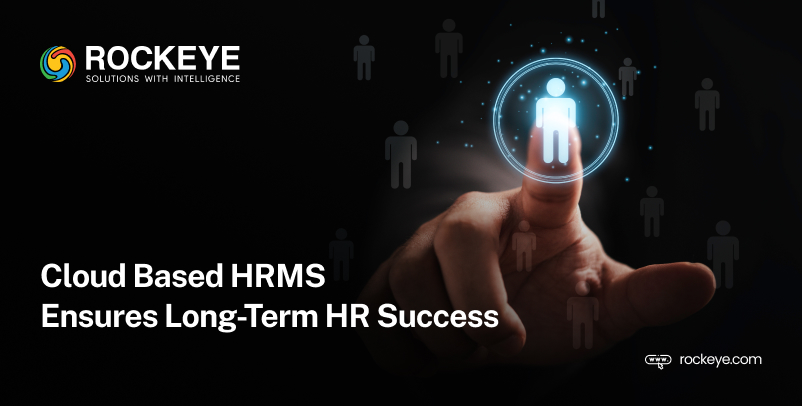In the quickly changing world of HR management, the adoption of cloud based HRMS software has emerged. Enterprises are now gradually recognizing the need for cloud based HR systems to streamline their HR operations and have an edge over their competitors.
As guardians of a company’s most valuable asset-its people, HR managers need to maintain a fine balance between embracing innovation and retaining the human touch. The intricate interplay between technological efficiency and human connection is necessary for navigating the complex landscape of contemporary work culture.
Human Resource Management Systems (HRMS) not only offer a technological edge but play a transformative role that goes beyond streamlining processes. We focus more on the aspects of efficiency but are centered around humanity to create an adaptable work environment.
What is Cloud Based HRMS Used for?
A cloud based HR system unites data from a centralized platform which offers better and hassle-free HR management. Other types of cloud-based human resource management system software provides specific HR functionalities like payroll systems and recruitment systems. However, the ideal choice is a cloud-based HR system that can handle all aspects of HR.
These systems enable you to manage everything starting from payroll to training in one place, enabling you to save both time and energy.
Modern HR demands are growing quickly along with external factors such as legal requirements continuing to change frequently. There is also immense pressure from top management on HR operations as significant cost wastage is linked to HR-related issues like absenteeism and skill gaps.

In 2021, the HRM software market size was valued at $USD 13.3 billion. The HRM software market is projected to grow from $14.92 billion in 2022 to $33.40 billion by 2030, showing a CAGR of 12.2% during the forecast period (2024-2032).
At present, many organizations are prioritizing HR to drive significant cost savings and success. As the major driving force of the whole organization, employees need to carefully and efficiently manage the best results. That’s where comprehensive cloud-based HR systems come into play.
Also Read: 16 Ways HRMS Optimizes Employee Engagement and Productivity
How to Select Between Cloud vs On-Premises Software?
The major difference between on-premise and cloud software is the location. On-premise software is installed and runs on the hardware infrastructure of a company, and is locally hosted. In comparison, cloud software is stored and managed on the servers of the providers, and can be accessed via an interface or web browser.

It’s not a surprise that cloud computing has become very popular and its promise offers a lot of flexibility for enterprises, from saving both time and money to enhancing agility and scalability. On the other hand, on-premise software, installed on the servers of a company and behind its firewall was only for companies for a long time and might continue to serve your business needs.
Moreover, on-premise applications are secure, and reliable and allow companies to maintain a level of control which the cloud often fails. However, there’s agreement among decision-makers in the IT sector that in addition to their on-premise and legacy systems, they’ll need to use new cloud and SaaS applications to achieve their objectives.

On-Premise Software
Whether a company places its applications in the cloud, or whether it decides to keep them on-premises, data security is always of paramount importance. But for businesses from highly regulated industries, the decision might have been made as to whether to house their premise or applications.
By opting for licensed software which resides within the premises of an organization, there is usually more protection than with a cloud computing infrastructure.
However, an on-premise environment has some disadvantages as well. The costs related to management and maintenance of all solutions are far higher as compared to a cloud computing environment.
An on-premise setup requires in-house server hardware, integration capabilities, software licenses, and IT employees on the other hand support and manage potential issues that might arise.
Cloud Computing
Cloud computing is different from on-premises software in one major way. An organization hosts everything in-house in an on-premise environment, while in a cloud environment, a third-party provider hosts everything for you.
This enables companies to pay on an as-required basis and effectively scale up or down based on overall usage, user requirements, as well as a company’s growth. A cloud-based server uses virtual technology for hosting the applications of a company’s offsite. There are no capital expenses. Data can be backed up regularly, and firms only need to pay for the resources they use.
For those organizations that plan aggressive expansion across the world, the cloud has even more appeal since it enables you to connect with partners, customers, and other businesses anywhere effortlessly.
Moreover, cloud computing features almost provisioning since everything has already been configured. Therefore, any new software that is integrated within your environment is ready for use immediately once an organization has subscribed.
9 Major Advantages of Using A Cloud-based HR System

Cloud-based HRMS plays a major role in the success of an organization. The efficient management of HR processes is essential for any organization that wants to grow in today’s highly competitive market.
In recent years, more and more businesses are adapting to the use of cloud-based HR software, because of the numerous benefits it offers over traditional on-premises solutions. Here are some reasons why businesses need to adopt cloud based HRMS –
1. Predictive Analytics
Cloud-based HRMS possesses accurate reporting and analytics capabilities, enabling HR professionals to analyze data and acquire insights into their workforce. Artificial intelligence within HR systems helps to track employee performance and take steps to deal with factors that cause productivity loss.
Using cloud based HRMS will help you to identify the reasons behind HR issues such as attrition and take corrective measures. Though it is a new technology, it plays a major role in ensuring firms remain competitive.
Also Read: How Does A Document Management System Improves Productivity?
2. Accessibility
Cloud based software offers a high level of flexibility and accessibility. It allows professionals to access the system virtually, at any time if there is internet access. It allows employees to take a proactive role in the company’s needs.
In a PwC HR Tech Survey 2022, 86% of adopters of cloud-based HR software boosted productivity. Moreover, there was seamless communication and collaboration between colleagues from various locations and within the company’s departments.
3. Mobile Compatibility
Cloud-based software is compatible with mobile devices, helping HR professionals to access systems from tablets or smartphones. This level of flexibility allows employees to respond to requests and fix issues on the move, improving efficiency and productivity.
The mobile-friendly user interface makes it easier for users to adjust to cloud-based HR computer programs quickly and seamlessly. As per a 2022 report by PwC HR Tech, companies that don’t use cloud-based HR programs are 4 times more likely to face barriers in improving user experience.
4. Security
Security is one of the prime concerns of an organization that wants to adopt cloud based HRMS. What can you do to stop hackers from stealing private information? How can data be accessed by authorized users? These are some major questions that bother users.
Since all confidential information is stored in the system, these details need to be protected. For addressing these concerns, data encryption, multiple-factor authentication, and routine backups are some of the few security measures which cloud based HRMS companies offer.
To address these concerns, data encryption, multi-factor authentication, and routine backups are some of the few security measures that cloud HR software companies provide. 88% of respondents in a 2022 PwC HR Tech survey reported that the deployment of cloud HR systems was beneficial in enhancing data security.
5. Automation
The days of extensive paperwork and physical filing cabinets for storing information are outdated now. Spending hours on time-consuming tasks leads to a waste of both time and money. According to a Gartner report, 56% of companies utilize HR software for automating repetitive jobs.
This type of software can effortlessly automate and streamline numerous HR processes, save time, and minimize inconsistencies. For instance, onboarding and offboarding processes, scheduling interviews, or sending reminders can be automated, freeing HR staff to focus on more important tasks.

6. Integration
It can be a daunting task to integrate traditional HR systems with other applications occasionally. Cloud-based HR software faces no such issue. It can smoothly integrate with other systems and applications, including benefits, payroll, time, and attendance, using APIs.
Moreover, it can streamline processes and minimize the need for manual data entry, saving time and minimizing errors. Moreover, companies can easily add the latest innovations using secure APIs or plugins, keeping the system updated.
7. Affordability
Cloud based HR software is all-inclusive for automation of HR processes and access to employee data in one place. It is an investment for reducing time and effort considerably.
Many companies have adopted cloud technology in payroll systems to avoid miscalculations in tax, salary, and incentive calculations, as well as other HR processes. Automation also helps businesses with unique data to improve the productivity of the HR department.
8. Quick and Seamless Implementation
Cloud-based HR solutions can be easily implemented in any sector or organization of any size. You won’t have to invest in infrastructure, upgradation, and removal of bugs. The HR software vendors are responsible for removing bugs and management of data.
Also Read: How Visitor Management Systems Enhance On-Site Security?
9. Cohesive Teams
Before the advent of cloud technology, HR management systems (HRMS) were predominantly on-premises solutions, requiring significant infrastructure and maintenance investments. These traditional systems often faced challenges such as limited accessibility, scalability issues, and high costs associated with hardware and software updates.
8 Major features of Cloud-Based HRMS
Cloud based HRMS solutions improve efficiency and accessibility by integrating different HR functions within a single, user-platform. Some of these features include –
1. Resource Management
Cloud-based HRMS is altering training management by offering seamless integration, real-time tracking and also personalized learning experiences. These systems help organizations to efficiently manage employee development using centralized platforms such as scalability and accessibility.
2. Employee Performance Management
Employee performance management includes employee database management, time and attendance tracking, payroll processing and performance management. You can use this data for measuring KPIs and other indicators.
3. Training Management
Cloud-based HRMS is altering training management by offering seamless integration, real-time tracking and personalized learning experiences. These systems help organizations to efficiently manage employee development via centralized platforms which offer scalability and accessibility.
4. HR & Benefits Administration
This includes features for administering and managing total review programs, like compensation and benefits, recognition, appraisal, and performance management.
5. Attendance Management
Attendance management includes information related to the paid and unpaid leaves and time logs of the employee. It is useful for the year-end appraisal process and for measuring the overall performance for a particular period.
6. Workforce Analytics
Workforce analytics includes features that offer insights into the workforce, like performance trends, employee engagement, diversity, and inclusion. These features offer a clear picture of a diverse work culture.
7. Skill Management
This includes features for offering employees with tools and resources they require for developing their skills and careers. It can help your company to upgrade the skills of team members and boost their productivity.
8. Personal Data Management
This includes the management of personal data of employees including their addresses, account details, etc. It can safely store the confidential data of your team members.

Conclusion
Cloud based HRMS computing is a comparatively new technology in the block which is transforming each aspect of the business process. It has altered the way HR departments across organizations handle large volumes of data.
Cloud computing helps a lot in automating mundane tasks, streamline HR processes, and help organizations in all HR related activities. Therefore, we can confidently say that cloud technology is going to change the future of the HR profession.
How ROCKEYE Can Help You?
We have years of experience and knowledge in developing HRMS solutions to streamline all aspects of the HR operations process. Using our HRMS solutions, you can ensure accurate time tracking with employee timesheets to a centralized database of employees.
Using our HRMS impact solutions, you can manage daily timesheet updates in one system. The employees of your company can log in during their work hours, track patterns, and have a clear view of the way their time gets used. This will help ensure proper collaboration and communication.
Our cloud-based HRMS solutions will help you manage your employee training and conduct surveys on behalf of your company. The staff can participate in training or respond to surveys using the ESS portal.
Frequently Asked Questions
The blog has chalk out the majority of information and details about HRMS. If you are still intrigued, you can refer to the questions given below.
How combining AI in cloud-based HRMS reshaping the talent acquisition process?
AI integration in cloud-based HRMS has improved the process of talent acquisition. From automating candidate screening to matching and shortlisting, it has reduced the manual process and efforts of HR professionals.
What role of blockchain technology in the future of cloud-based HRMS?
As businesses are digitalization, the emergence of blockchain technology due to its secure and safe process has become prominent. Blockchain technology in HRMS translates to streamlining the recruitment process with decentralized identity verification, ensuring data security, and enhancing employee engagement and safe contracts.
What role of predictive analytics in cloud-based HRMS for employee retention?
Employee turnover is crucial in the process of Human resources management. With predictive analytics, it serves as a powerful approach. Predictive encompasses historical data, statistical algorithms and ML integrated collaboratively fosters to predict future outcomes. From forecasting and prevention, it plays a pivotal role.
What are emerging trends for cloud-based HRMS concerning data privacy and security?
Employees’ data are sensitive. With more threats and breaches, it’s crucial to safeguard every inch of data. Implementation of zero-trust security models, latest encryption techniques, blockchain technology and adoption of AI-drive threat detection systems allows to smooth the process and ensure compliance with existing data.
What are the factors that I should look at in cloud-based HRMS?
Cloud-based HRMS provides a single-channel communication point. Be it for recruiting, shortlisting, or retaining. A comprehensive HRMS combined with AI and the cloud would help automate routine tasks to improve overall efficiency and employee satisfaction.
It should encompass features like an automated onboarding process, analytics, business performance management, automated recruitment, and more.

